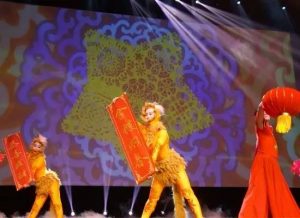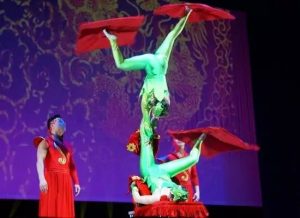David Feng
This interview was originally first posted on the uk.china-info24.com (Nouvelles d’Europe UK) website. It has been reposted here with permission and has been slightly adjusted for improved presentation only. Please also note the Errata notes. You may read the original interview by clicking the link on the bottom left-hand corner at the very end of the article.
Straddling Chinese and Western culture, Beijing-born media academic Dr David Feng moved to Zurich, Switzerland at the age of 6 with his parents, where he subsequently spent 12 years of his life. It was there he formed his multilingual identity: he is fluent in English, Mandarin, French, German, and Italian. He then spent his university years in China and gained a PhD at the Communication University in Beijing.
He now teaches, blogs and on the side balances presenting. Last month he hosted the 2016 Year of the Monkey gala, Cultures of China, Festival of Spring in Portsmouth at The King’s Theatre. He talks to us about his presenting experience, what makes good translation and his relationship with China.
“In a very typical Chinese way if you did something good it went round by word-of-mouth.”
It doesn’t take us long to get started, Feng tells us how he stumbled upon presenting a couple of years ago, when he was approached as a substitute English presenter in Xiamen, China; the organisers needed someone who could come across well in English — Feng happened to be in the right place at the right time. This led to a string of presenting opportunities, with organisations such as the Chinese Media Centre at University of Westminster (where he currently teaches), the Hebei Society in London and UK-China Association of Linguists, whom recommended him to host the 2016 Year of Monkey Cultures of China, Festivals of Spring gala in Portsmouth. “In a very typical Chinese way if you did something good it went round by word-of-mouth,” says Feng.
With an audience of around 1500 people, the night followed a variety of Chinese cultural performances, acrobatics, folk dancing, music and singing that saw a visible presence of locals and members of the UK Chinese community. Feng received a flood of congratulatory messages thanking him for being a warm and professional host.
2016 Year of Monkey, Cultures of China, Festival of Spring gala at Portsmouth, The King’s Theatre (Wang Meng Liu)
Arriving five hours early to meet the presenters, compile the scripts, and make last changes, Feng gives us a glimpse of the world of presenting: “It’s about being welcoming, it’s not just about holding a mic and listening to what’s up next, you are part of a whole team and there is no place to be negative. Everyone has to be ready for prime time, the audience cannot be drawn a blank for eight seconds or more.” As things can change last-second on stage, you have to be really prepared and sharp he adds, having previously seen a fellow co-host drop out due to the immense pressure.
On translation: “The process is akin to pressing oranges and squeezing the essential parts.”
How do you successfully translate and present to an English-language audience? “The process is akin to pressing oranges and squeezing the essential parts.” says Feng. It’s not useful to translate from Chinese to English character by character, it’s more important to grasp and convey the overall meaning, particularly when interpreting officials’ speeches as they tend to say things in a fixed way. It’s about keeping it simple and addressing the central elements, as Chinese New Year is essentially about family, prosperity, health, money and progress.
Though most of his emceeing experience has been in English which is his preferred language, he is open to presenting in Mandarin Chinese in the future.
Though most of his emceeing experience has been in English which is his preferred language, he is open to presenting in Mandarin Chinese in the future. With a passion for languages, he cares about good translation and looks to boost the level of English in China. One of his recent projects: Everyday Rail English looks to make English train signs in Beijing comprehensive and accessible for foreigners visiting. It is the case that “some expressions in China are forcibly translated into English, as they try to translate character by character.”
Railway Chinglish (David Feng)
His most up-to-date project is a book based on his train travels in China where he voyaged from North to South experiencing the cold icy temperatures of Heilongjiang, to the mountainous and forest terrains of Kunming, the distance covered roughly equal to the distance from Stockholm to Rome. Talking fondly of the old green trains and the amusing scenes of train attendants singing and selling a basket of goods, Feng emphasises the uniqueness of Chinese train travel. Whereas trains are quiet in the UK, in China they are lively and loud and are at the heart of everyday life.
“Local friends in Beijing would say I raised my glass to toast too much, everything back then was completely new to me — it was like a reverse culture shock.”
After learning the hard way in the first two years of living in China, he is conscious he doesn’t want to be too much of an “exception to the rule”. At the start, “local friends in Beijing would say I raised my glass to toast too much, everything back then was completely new to me — it was like a reverse culture shock.” Nowadays he speaks the language and mingles with the local community at times, though he is aware he has to turn off an international way of thinking and “just go with it”.
As a native Chinese and Swiss citizen undoubtedly Feng will always be part of the dialogue of both cultures, and his returning to China will lead him to soak up more experiences that will help inform the greater world about the country.
Errata:
1. The 8-second rule applies only to some media organisations in China. It did not apply for live presentations at Portsmouth.
2. It is important to note that there was only an incident when the other presenter (note: not any presenter at the Portsmouth gala) was about to drop out. The dropping out did not actually occur.
You may read the original interview on uk.china-info24.com by clicking the link here
Source: by the author
Note: CCPN Global is not responsible for the content.





